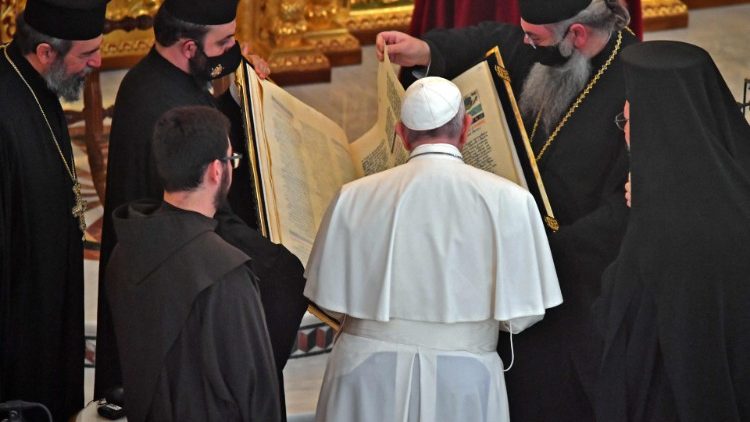As the Week of Prayer for Christian Unity was opened, Bishop Brian Farrell from the Pontifical Council for Promoting Christian Unity reflects on some of the aspects that may have had an effect on Christian unity during this historic period.
Tuesday saw the opening of the annual week of prayer for Christian Unity, taking place from 18 to 25 January 2022. The theme for this year’s observance is “We saw the star in the East, and we came to worship him”, recalling the experience of the Magi, who came from the East to Bethlehem to worship the Messiah King.
In his Angelus on Sunday, the Pope said that in a similar way, Christians of diverse backgrounds and traditions “are pilgrims on our way to full unity” who come closer to our goal when keeping our gaze fixed on Jesus.
This years’ theme
The theme, according to Bishop Brian Farrell, Secretary of the Pontifical Council for Promoting Christian Unity (PCPCU), is really “an invitation to all Christians to return to our origins and our origins are in Christ”. He explains that the theme tells the story of the Magi, the wise men from the East, coming to adore the infant Jesus:
“This is very important for us, ecumenically, in the sense that we will never have the unity of Christians if we do not have the same faith and the same approach, the same acceptance of the salvation history that began in that moment of the birth of Jesus”.
Bishop Farrell explains that to summarise, the theme is simply “a call to centre our effforts on the person and mystery and the world of Jesus”.
The Week of Prayer
The Week of Prayer for Christian Unity is held annually, and is organised by the PCPCU which Bishop Farrell says, has as its task and mission the promotion of all the efforts of the Catholic Church to reconcile all Christians in the one Church that Christ prayed for “when he asked that we all be one, like he and the Father are one.
Ecumenism and papal journeys
In an interview with Vatican News, Bishop Farrell reflects on some of the aspects of Christian Unity that truly stand out at this moment. One of these is the impact some of the Holy Father’s most recent journeys may have on ecumenism. Bishop Farrell notes that naturally, “the ecumenical journey is a long one”, and that, despite the significance of the Pope’s recent journeys, “we mustn’t think that one journey or one year of journeys is the end of the road”. He explained that each journey should be seen as a building block.
“When the Pope comes to a country where he meets Christians of other Churches, his understanding and sense of respect and mutual acceptance of them is a wonderful step forward in creating the conditions so that one day we can be reconciled”.
Bishop Farrell notes some of the Pope’s trips this year: Iraq, Greece, Cyprus, Budapest and Slovakia, he noted, “all of these have been moments of intense frienship and relationship with Christians of the other churches”, all of these, he adds, “building blocks along the way towards the end of the ecumenical journey”.
Ecumenism and the pandemic
Another topic relevant to the ecumenical journey is the current Covid-19 pandemic, which Bishop Farrell notes, has had both a positive and a negative impact on Christian Unity. On the one hand, he begins, “cooperations between Christians of different churches have been supported by the fact we are all suffering the same pandemic”. Bishop Farrell explains:
“Churches are working to help their people, and to help society in general to face the consequences of this pandemic”.
On the other hand, he continues, building contact and working towards ecumenical dialogue has become more difficult. He explains that meetings on the internet are fine, but that they “do not permit the kind of trust-building and building of understanding that is necessary in theological dialogue”. So although of course, there has been “lots of ecumenical progress on the level of real-life response to the pandemic”, there have also been some difficulties “in carrying forward our programme of theological dialogue between the leaders of the churches“.
Ecumenism and synodality
Bishop Farrell then goes on to speak of the relationship between the PCPCU and the upcoming Synod of bishops on Synodality. He explained that the Council has been “very quick” to invite all the bishops’ conferences of the world “to ensure that when the dioceses and local communities organise their consultations in preparation for the eventual synod, they invite members of the other churches with whom they have contact to also express their thoughts”. He explains that this is essential because “what we are actually doing in the synodal process is to listen to the Church and above all to listen to what the spirit is saying to all of those who belong in some way to the Church”. This, he adds, is an opportunity for every diocese and for every local community to open their doors to “a new and deeper ecumenical relation in their area”. This, concludes, Bishop Farrell is essential in showing the determination of the Catholic Church to carry forward the process of restoring Christian unity.
Finally Bishop Farrell stresses the importance of this Week of Prayer for Christian Unity, and invites everyone to take part, “so that we do the first important thing that will eventually bring about full communion among Christians – and that is: to pray”.
See also:
Catholics in Kazakhstan join in prayer for victims of unrest
The Missionaries of Charity will continue receiving foreign donations
Catholic Church in Poland wants to get through to young people
